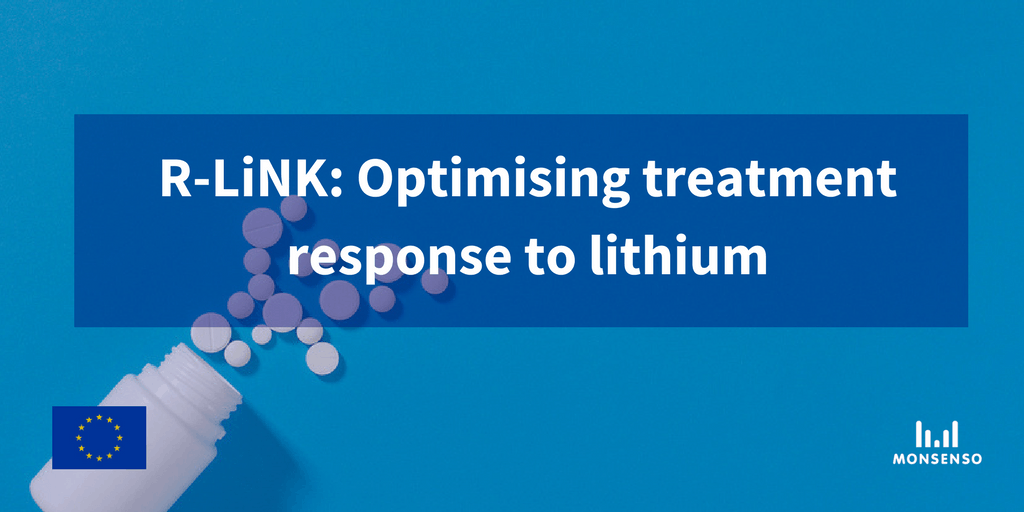
Monsenso provides medication adherence and behavioural monitoring components in H2020 Funded R-LiNK Study
Monsenso’s mHealth solution participates in the R-LiNK Study, a major new study for optimising treatment response to lithium
Copenhagen, Denmark – 16 April 2018 Monsenso is proud to announce our participation in R-LiNK – the major new study for developing a more complete understanding of the reactions and effects of taking lithium. As a part of this study, our solution will be implemented for 300 participants across 15 centres all over Europe.
Lithium is the leading treatment for patients with bipolar disorder. There is a large variability across patient responses when taking lithium. This variability makes it difficult for clinicians to predict how patients will respond to being prescribed lithium.
“Lithium is the oldest drug treatment used regularly in psychiatry and one that has shown evidence of many benefits over the decades it has been used. However, only about one third of patients are “excellent” responders with a future two thirds showing partial or no response. This large EU funded study takes place across Europe and aims to find out which “biomarkers” can be used to predict which patients will respond and for those whom lithium will not help,” said Professor Allan Young, Director of the Centre for Affective Disorders at the Institute of Psychiatry, Psychology & Neuroscience, King’s College London.
R-Link is a multimodal approach to studying lithium initiation, and identifying important biomarkers from receiving lithium treatment. The comprehensive study aims to identify factors related to better responses, safety, and tolerability of lithium treatment. The results of the study can help provide patients and clinicians alike with more accurate information to make informed decisions regarding the prescription of lithium, therefore improving the long term management and prognosis for bipolar patients.
“Mobile health technology can provide new insight into the treatment of mental health and disorders, and mobile phone usage can also provide important new biomarkers for affective disorders.” said Professor Lars Kessing, of the Psychiatric Center Copenhagen and the University of Copenhagen, Faculty of Health Sciences.
The Monsenso mHealth solution will be involved in the phase of the study that will conduct a qualitative and quantitative study on the acceptability and efficacy of connected ecological devices to monitor mood, lithium levels, symptoms, daily behaviour, and enhance patient adherence. Therefore, the solution will include data collection of lithium adherence and outcome/behaviour reporting (via sensor data and daily self-assessment).
“Ensuring adherence to medical treatment on an individual level is key to a successful mental health treatment. Our mHealth solution will contribute to this study by promoting medical adherence, through providing easy, personalised self-monitoring and medication tracking, as well as medication reminders.” said Thomas Lethenborg, CEO of Monsenso.
This study also has the potential to enable the personalisation of lithium based treatment. Findings from this study can also contribute to the overall prevention and reduction of unnecessary side effects from lithium treatment as well as overall ineffective treatments.
Monsenso is now involved in more than ten pan European and domestic research projects in the mental health & affective disorders field.
The study is presently ongoing.
Click here to read the press release in Danish.

This project has received funding from the European Union’s Horizon 2020 research and innovation programme under the grant agreement No.754907.
